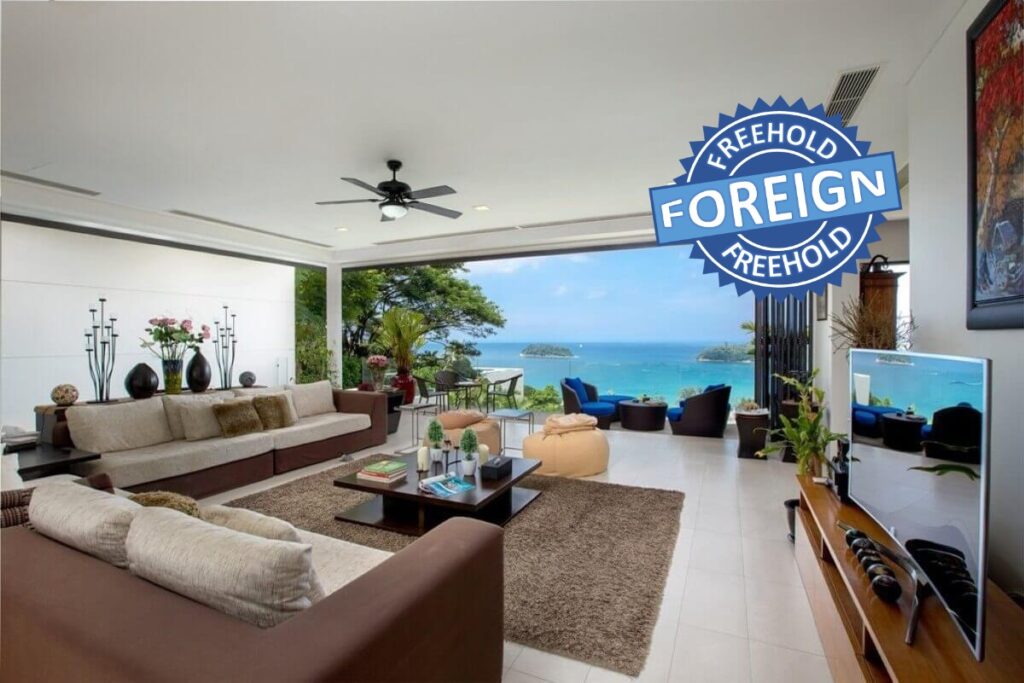Phuket offers a wide variety of property types, from apartments and condominiums to villas, detached houses, semi-detached homes, and townhouses. These properties come in diverse styles, ranging from sleek contemporary designs to more traditional Asian and Balinese influences, often blending different architectural elements. With a broad range of price points, buyers can choose between garden-view homes, sea-view residences, and luxurious beachfront properties. For villas houses, investors also need to decide whether to buy a stand-alone property, or on one in a communal development. In this article, we’ll focus on comparing two popular property types: condos and apartments in Phuket.
What is the difference between a freehold condominium an apartment in Thailand?
Although the terms “condominium” and “apartment” are often used interchangeably, when discussing real estate, there are geographical preferences for each. For instance, in the U.S., an apartment may well be called a condominium, while in the UK, people generally refer to them as apartments, or flats. However, in Thailand, there is a clear distinction between the two.
In a development with a condominium license, the developer can sell freehold units to foreign buyers, making this a significant difference. Freehold condominiums in Phuket, and throughout Thailand, differ from standard apartments because they possess this condominium license. This license allows up to 49% of the private living space in a condominium building to be purchased by foreign investors on a freehold basis, the freehold of the property being registered directly in the foreign buyers name, with the remaining 51% owned either by Thai nationals, held in a Thai company, or leased to foreigners.
For regular apartments in Phuket—those without a condominium license—the ownership structure is typically either a 30-year lease or shares in a company that holds the freehold. In some cases, an apartment might involve both a lease and shares in the freehold-owning company. This dual approach is known as a “protected leasehold” structure, as owning shares in the freehold company provides added security for lease renewals. According to Thai law, a 30-year lease is the maximum for one term, but contracts often include options to renew for one or more additional 30-year periods, extending the total lease period.
What is the price range for condos and apartments?
There is a diverse range of price points for both condominiums and apartments. Investors can get on the property ladder for as little as 60k USD but large exclusive sea view and oceanfront units, often penthouses, in premium locations, mainly on the west coast, such as Kamala, Nai Thon Beach, Surin Beach, can fetch up to a few million USD and more. Partly because these are commodity products, rather than bespoke villas more open to customisation, condos and apartments are often sold off plan, allowing investors to take advantage of substantial capital gain opportunities.
In which areas are these types of properties most prevalent?
A majority of these properties can be found along Phuket’s popular west coast, there are also numerous condominium and apartment developments near Phuket Town and in various inland areas such as Kathu and Si Sunthon. Additionally, some developments are located on the less developed east coast, in districts like Pa Klok and Ko Kaeo.
What facilities can I expect?
One of the advantages of purchasing a condominium or apartment over a villa or house is the wider range of facilities and services often available in these developments. Thanks to the larger number of units, even entry-level projects typically offer communal amenities such as a swimming pool, 24-hour security, and a reception area. Depending on the development, additional features may include a gym, spa, shuttle services, tennis courts, and more. Many complexes also provide in-house rental management, making them particularly appealing to investors. At the luxury end of the market, condos and apartments may even feature private swimming pools.
What Are the Maintenance Fees for Condos and Apartments?
All condominium and apartment developments in Phuket will have maintenance fees, often referred to as communal charges. These fees vary from one development to another, with no fixed standard. Typically charged monthly, the fees are calculated per square meter of the property’s living space and can range from 20 to 100 THB per sqm per month. Developments that offer more extensive facilities—such as gyms, spas, tennis courts, or concierge services—as well as lower-density projects, tend to have higher fees. These charges usually cover the upkeep of communal infrastructure, security, shared swimming pools, and other common areas but do not typically include maintenance for private pools or individual property areas.
Which are easier to resell, condos or apartments?
Reselling a property can depend on numerous factors, including location, property style, the reputation of the developer, available facilities, the condition of the unit, and the return on investment it provides. However, the key point is that, other things being equal, a freehold condominium is generally easier to resell. This is because it is owned in perpetuity, without the complications of lease renewals or concerns about the remaining years on a lease, making it a more straightforward option for buyers.
Please see our full portfolio of Phuket property for sale
